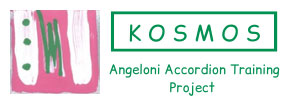KOSMOS Angeloni Accordion Training Project-EN

KOSMOS Angeloni Accordion Training Project is a didactic project created with the dual aim of training accordionists and spreading the study of the accordion. It is based on the most modern psycho-pedagogical instances, developed by the author over the last thirty years through study, research and experimentation.
Its contents are recognised and used in various educational contexts, sometimes under different names, and documented with the publication of articles by organisations specialised in music education such as: ISME (International Society for Music Education), the Research and Experimentation Centre for Music Didactics; Società Italiana per l’Educazione Musicale; AIdSM – Italian Association of Music Schools. Connected to the project is the in-progress creation of publications with the title KOSMOS, declined in various subtitles, also for different publishers.
The project is articulated and developed in progress and is conceived and conducted exclusively by Patrizia Angeloni, who holds the rights, also in collaboration with various institutions including ARTIficio SONORO – Atelier internazionale – with the patronage of Nuovo Centro Didattico Musicale Italiano and Comune di Castelfidardo.
Why this project?
The considerable development of the accordion on the concert stage is not matched by an adequate basic training system, for various reasons mainly centred on practices that are not always up-to-date, mostly far removed from the psycho-pedagogical competence and modern musical identity of the accordion.
The production of teaching and research materials at an international level needs to be implemented and at the same time it is uncensored and difficult to disseminate and circulate.
In recent years the research of performers and composers has identified different instrumental identities in the accordion, together with the relative performance practices, contributing to the construction of a concert repertoire which, while remaining an elite experience still far from true mass diffusion, places the accordion, with equal dignity and richness, alongside the other instruments of so-called classical music.
This evolution, however, does not seem to be matched by an adequate development in the didactic dimension, even though there is a widespread need to refine and expand pedagogical practices, precisely because the growth and diffusion of each instrument is closely linked to the educational path from its earliest stages. The use of the accordion as an interpreter of different musical genres, not only in the sphere of classical music, calls for a new configuration of the training process.
Today, there is an increasingly strong need to broaden methodological reflection and to update didactic paths and musical training materials, not only to optimise learning, but also to bring the contents of the training path closer to those of the musical practices required by all repertoires (especially concert repertoires) and to resolve the dichotomy between traditional instrument and concert instrument, which in didactic materials seems to be insurmountable.
By now, reflection on the themes of instrumental didactics can no longer be exempt from considering the scientific acquisitions relating to the functionality of learning, with conclusions that, if on the one hand bring to light the reasons for the success of the best intuitions of certain empirical didactic practices of the tradition, on the other hand open the way to the production of new materials and to more precise didactic practices, also arousing the interest of the concert performer engaged in the personal and unquenchable process of self-education.
Moreover, it should be considered that, by virtue of its technical-phonic characteristics, the accordion can provide a musical, sensory and expressive experience of great richness, extremely useful and functional to the development and growth of the person. Hence, the need to develop and disseminate the accordion’s function as a privileged instrument of basic musical training, offered as early as nursery school and useful for the training of the future musician, as well as that of a good amateur or an aware audience.
The Project Objectives: a synthesis
- to develop and disseminate increasingly effective, scientifically based teaching practices that are useful throughout the entire educational process;
- to encourage the training of very young people to develop musical skills not only in the presence of extra-ordinary talents and useful as a solid and prolific basis for the development of all skills, from those of listener to those of performer, concert artist, performer;
- to develop the concertmaster’s self-training processes;
- to implement the dissemination of the accordion as a guiding instrument in the basic musical training of very young children;
- to update – train teachers professionally, transversally to academic paths;
- to implement research;
- to implement the production of teaching and musical materials;
- to offer young people opportunities for professional development.

Articoli
Canta' a Disfida
Frantotipico
IAC
Memoria storica
Strumenti&Musica Festival
